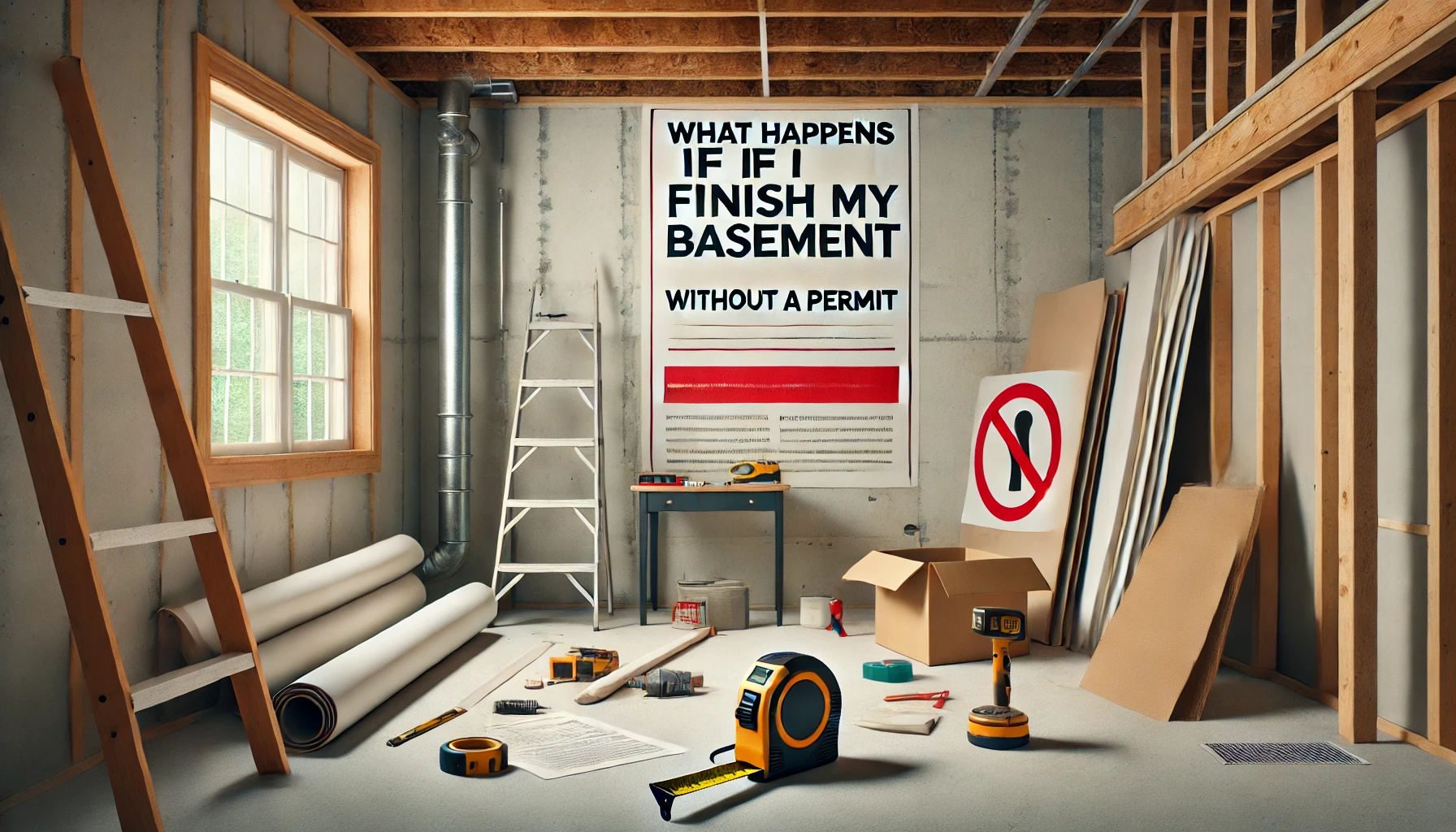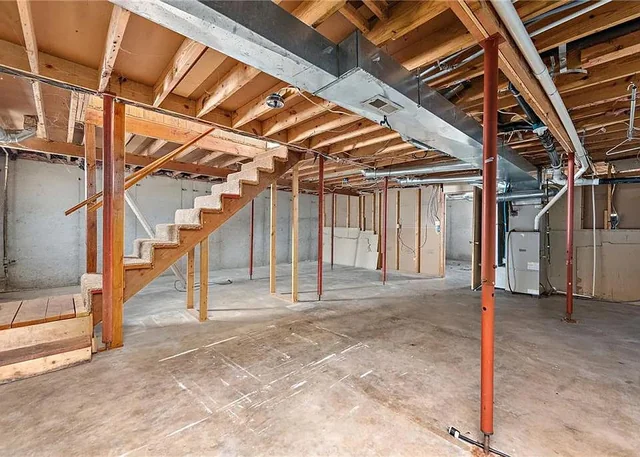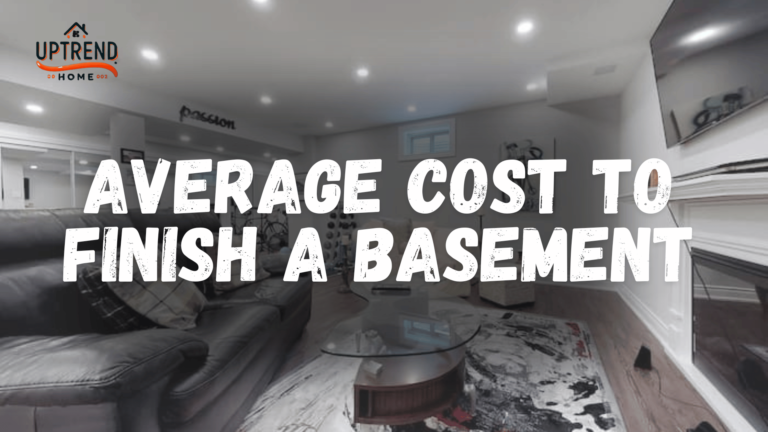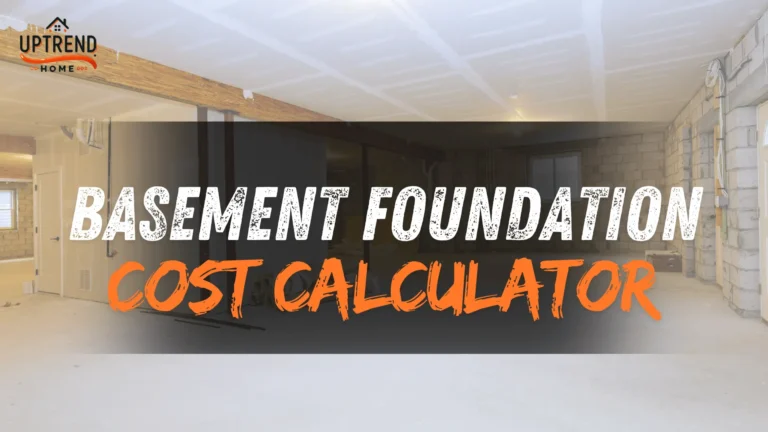What Happens If I Finish My Basement Without a Permit?

Finishing your basement is an exciting project that can add valuable living space to your home. However, jumping into renovations without proper permits can lead to unexpected headaches. Whether you’re planning a cozy family room or a functional home office, understanding the importance of permits is essential to avoid biting off more than you can chew.
A building permit isn’t just another bureaucratic hurdle—it’s a safeguard for your safety, property value, and peace of mind. Skipping this crucial step might seem like a way to save time or money, but it can open a Pandora’s box of problems, from legal troubles to financial losses.
This guide will walk you through the potential consequences of finishing a basement without a permit and highlight why playing by the rules is worth it. As the saying goes, “an ounce of prevention is worth a pound of cure.” By staying informed, you can ensure your dream basement doesn’t turn into a nightmare.
Ready to learn more? Let’s dive into the details of what happens when you skip the permit process and why it’s better to err on the side of caution.
Do You Need a Permit to Finish Your Basement?
When it comes to transforming your basement into a livable space, the big question is: Do you need a permit? The short answer is yes, in most cases. However, the type of work you’re planning determines whether a permit is required. Let’s break it down so you can confidently move forward without any roadblocks.
What Work Requires a Permit?
Permits are generally required for any work that involves:
1. Electrical Installations or Modifications
Adding outlets, installing lighting, or rewiring your basement? Electrical work needs to meet strict safety standards, and a permit ensures it’s inspected and up to code. Faulty electrical installations can be a recipe for disaster, so don’t cut corners here.
2. Plumbing Additions or Changes
Planning to include a bathroom, laundry area, or wet bar in your basement? Any plumbing changes, including installing sinks, drains, or new pipes, will require a permit. This helps avoid leaks or other issues down the road that could flood your basement—literally and figuratively.
3. Structural Changes
If you’re knocking down walls, adding new ones, or altering load-bearing structures, you’ll need a permit. These changes can impact your home’s stability, so inspections are critical to ensuring your basement remains safe and sound.
4. HVAC Installations
Expanding your heating, ventilation, or air conditioning system into the basement? Permits are needed to verify proper installation, ensuring your home stays comfortable without risking energy inefficiency or fire hazards.
5. Egress Windows or External Doors
Adding a new window or door that leads to the outside? These modifications are often required for basement bedrooms to meet building codes for emergency exits. A permit ensures the dimensions and installation meet safety standards.
Permits act as a safety net, catching potential mistakes before they snowball into costly repairs. While they may feel like a hassle, they’re a small price to pay for long-term peace of mind. In the end, staying compliant means your finished basement will be an asset, not a liability.
As they say, “better safe than sorry!” By understanding what requires a permit, you’re already one step closer to making your basement renovation a success.
Risks and Consequences of Finishing a Basement Without a Permit

Skipping the permit process when finishing your basement might seem like a shortcut to save time and money. But this seemingly small decision can snowball into significant problems. From legal fines to challenges selling your home, the risks are far-reaching. Let’s explore the key consequences you might face if you bypass the required permits.
Legal Fines and Penalties
When authorities discover unpermitted work, you could be hit with fines that go far beyond the original permit cost. These penalties vary by location but are often hefty enough to make anyone think twice. Worse yet, you may need to pay for additional inspections or retroactive permits, piling on more costs.
As the saying goes, “There’s no free lunch,” and the financial repercussions of skipping a permit prove just that.
Risk of Having To Undo Completed Work
Imagine completing your dream basement only to be told you have to tear it all down. This isn’t just a nightmare scenario—it’s a real possibility. Local building departments may require you to dismantle unapproved work so it can be inspected or brought up to code.
From ripping out drywall to rewiring electrical systems, the cost of undoing work can skyrocket, leaving you with a gutted basement and an empty wallet.
Decrease in Home Value
Unpermitted work can cast a long shadow over your property’s value. Appraisers may undervalue your home if they find that the basement doesn’t meet local building codes.
Prospective buyers might see unpermitted renovations as a red flag, steering clear of a deal that could bring hidden costs and legal troubles. In real estate, it’s often true that “an ounce of prevention is worth a pound of cure.”
Issues with Insurance Coverage
Insurance companies are quick to deny claims related to unpermitted work. For example, if a fire starts due to faulty electrical wiring in an unapproved basement renovation, your policy might not cover the damages.
This leaves you vulnerable to significant out-of-pocket expenses, turning what seemed like a cost-saving measure into a financial pitfall.
Problems with Selling or Refinancing Your Home
Unpermitted work can become a major roadblock when selling or refinancing your home. During inspections, the lack of permits might be flagged, forcing you to resolve the issue before proceeding.
Buyers often view unpermitted basements as risky investments, while lenders might deny refinancing applications due to noncompliance. It’s a classic case of “penny wise, pound foolish” when cutting corners leads to bigger problems.
Finishing a basement without a permit can feel like an uphill battle with no end in sight. By understanding these risks, you can make informed decisions and avoid costly mistakes. Remember, doing things by the book today can save you from a world of trouble tomorrow!
Can You Get a Permit for an Already Finished Basement?
If you’ve already finished your basement without a permit, all is not lost. In many cases, you can still obtain a retroactive permit to bring your work into compliance. However, the process can be complex, requiring thorough inspections and additional costs. Here’s a step-by-step guide and a look at the potential challenges you may face.
Steps To Obtain a Retroactive Permit
- Contact Your Local Building Department
The first step is to reach out to your local building authority. Explain your situation honestly—they’ve likely seen it all before. Ask about the specific requirements for obtaining a retroactive permit. - Schedule an Inspection
Prepare for a detailed inspection of the finished basement. Inspectors will check the work for compliance with local building codes, which could include electrical systems, plumbing, structural modifications, and safety features. - Address Any Code Violations
If the inspector identifies any issues, you’ll need to fix them. This might involve hiring licensed contractors to bring the work up to code. - Complete the Paperwork
Submit the required documents, including plans or blueprints of the finished work. If these aren’t available, you may need to recreate them, which can add time and expense. - Pay the Fees
Be prepared to pay for the retroactive permit, which often includes additional fines or penalty fees for unapproved work. While this might sting, it’s a necessary step to legalize your basement. - Obtain Final Approval
Once all corrections are made and fees are paid, the building department will issue the retroactive permit. Congratulations—your basement is now compliant!
Challenges and Risks of Retroactive Permits
While obtaining a retroactive permit is possible, it’s not always smooth sailing. Here are some hurdles you may encounter:
- Costly Corrections
Bringing unpermitted work up to code can be expensive, especially if significant issues are found. For instance, rewiring electrical systems or fixing improper plumbing installations might cost thousands of dollars. - Failed Inspections
If inspectors determine the work is substandard or unsafe, they may require you to undo completed renovations. This can lead to additional expenses and delays. - Potential Fines
Some jurisdictions impose fines for not obtaining a permit in the first place, even if you eventually legalize the work. - Time-Consuming Process
Securing a retroactive permit can take weeks or even months, especially if multiple corrections are needed. - No Guarantee of Approval
In rare cases, the work may be deemed noncompliant, and obtaining a permit may not be possible. This could result in a requirement to restore the space to its original condition.
Obtaining a retroactive permit is a lesson in “better late than never.” While the process may be challenging, it’s a crucial step to protect your investment, ensure safety, and avoid legal or financial issues down the road. Taking responsibility now can save you from even bigger headaches in the future.
How To Properly Obtain a Permit Before Finishing Your Basement
Getting a permit before starting your basement renovation might feel like a hassle, but it’s a small step that can save you from big problems down the road. From where to apply to the advantages of hiring a professional, here’s everything you need to know to navigate the process smoothly.
Where and How To Apply for a Basement Permit
- Contact Your Local Building Department
Start by reaching out to your city or county building department. They will provide you with the specific requirements and application forms for your area. - Determine the Type of Permit You Need
Basement permits often cover various aspects, including structural changes, electrical work, plumbing, and HVAC installations. Be clear about your project scope to ensure you apply for the right permits. - Submit Your Application
You can usually apply in-person at your local office or online via the building department’s website. Prepare to provide:- Detailed floor plans or blueprints.
- A description of the work to be done.
- Contractor information (if applicable).
- Pay the Permit Fees
Permit fees vary depending on your location and the complexity of the project. On average, expect to pay between $100 and $500, though larger projects may cost more. - Schedule an Inspection
Once your application is approved, you’ll need to schedule inspections at various stages of the renovation (e.g., after electrical or plumbing installations). This ensures everything meets building codes.
Benefits of Hiring a Professional Contractor
While DIY renovations can be rewarding, hiring a licensed professional for your basement project comes with significant advantages:
- Ensures Compliance with Building Codes
Professional contractors are well-versed in local building regulations and permit requirements. They can handle the application process and ensure your project meets all safety standards. - Avoids Costly Mistakes
A contractor’s expertise reduces the likelihood of errors that could lead to failed inspections or costly rework. For example, improper wiring or inadequate insulation can create major headaches down the line. - Saves Time and Effort
Renovation projects require meticulous planning and execution. A contractor can streamline the process, saving you from navigating the complexities of permits, inspections, and code requirements on your own. - Provides Peace of Mind
With a professional on your side, you can rest easy knowing your basement will be finished safely, efficiently, and up to code.
Obtaining a permit before finishing your basement might feel like jumping through hoops, but it’s a vital step to protect your investment and ensure safety. Whether you handle the process yourself or enlist a professional contractor, doing things the right way upfront can save you time, money, and stress in the long run. Remember, “measure twice, cut once” applies not just to carpentry but to planning your entire renovation project!
Conclusion: Why Permits Are Worth the Effort
Obtaining a permit for your basement renovation may seem like an extra step, but it’s an essential part of ensuring a smooth and successful project. While the process might take a little extra time and cost upfront, the benefits far outweigh the potential risks of skipping it.
Permits guarantee that your basement renovation meets local building codes and safety standards, which protects both you and your property. If you skip this step, you risk facing costly fines, the possibility of needing to undo your work, and even complications when trying to sell or refinance your home. Additionally, your insurance may not cover damages from unpermitted work, leaving you vulnerable in case of an emergency.
By taking the time to apply for a permit, you’re not only safeguarding your investment but also ensuring that your basement is a safe, functional, and valuable part of your home. Remember, a little effort spent now can save you a lot of stress and expense later. So, take the time to do things right—getting a permit is worth the effort for peace of mind and long-term benefits.






